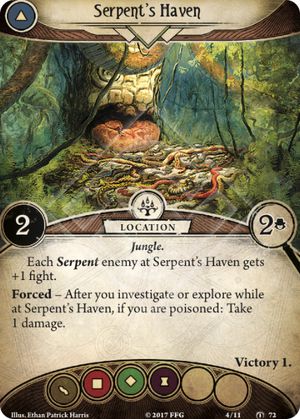
This is the card that is going to open Extreme mode to the masses (like me). It greatly improves the math of the bag. Let me show how!
You have yourself a standard Extreme bag, as follows: 0, -1, -1, -2, -2, -3, -3, -4, -4, -5, -6, -8, , , , , , , . Obviously the special tokens will vary, but let's say for argument's sake that the and are -3, and the and are -4. That actually seems somewhat generous!
Here are your odds of passing checks. The first number is with the plain bag, the second is with 5 's, and the third is with 5 's AND Ancient Covenant.
Even: 11% / 16% / 29%
Up one: 21% / 29% / 38%
Up two: 32% / 42% / 46%
Up three: 58% / 64% / 67%
Up four: 79% / 81% / 83%
What's the takeaway? If you are already well up on a test (say a +4), Ancient Covenant gives you a bit of cushion but not much. You'll probably pass anyway, and if you draw a , you're even more likely to pass, because by then you're +6. But if you're starting up just one? Even after that pull, there's still plenty that can sink you. Ancient Covenant gives you a fighting chance at checks that in Extreme mode are usually long shots.
BUT WAIT THERE'S MORE!!!
Sacred Covenant also helps you keep more 's in the bag. How? By cutting down on the frequency with which you draw multiple 's in one check.
BUT WAIT THERE'S SO MUCH MORE!!!!
This may be jumping the gun a little bit, but there's a new card coming out in the Lair of Dagon called Favor of the Sun (not yet up on arkhamdb but announced by FF). That card allows you to seal three bless tokens and draw them during any check instead of something from the bag. Combined with Ancient Covenant, that effect is INSANELY powerful, especially on higher difficulties. It allows you to auto-succeed in the most scandalous way. You can be two DOWN on a check, and pass it without modifying it a bit. How good is that? Let's see:
Pnakotic Manuscripts allows you to avoid pulling tokens on three tests, guaranteeing success as long as you're skill value is even with the difficulty. It costs 5xp, 5 resources, and takes up a hand slot. It also costs an action to play and an additional action every time you use it, unless the test was during a revelation effect.
Favor of the Sun + Ancient Covenant also guarantees success on three tests, but you can be down as much as two. The combo costs 3xp, 2 resources, and takes up no slot at all. And it costs no actions, not even to play, because for some reason Favor of the Sun is fast!
This combo opens up a lot of new strategies for Extreme mode. Of course, Favor of the Sun is max two cards, so you'll want to use other Extreme strats as well: automatic clues and damage whenever possible, fail-forward options. But now you don't have to fear checks quite so much. A card like Pilfer, which seems crazy to run when there's a -6 and a -8 waiting for you, now could have a spot in your deck.
So, if you've been eyeing Extreme mode for a while but haven't had the courage to take the plunge, come on in: the water's warm!



